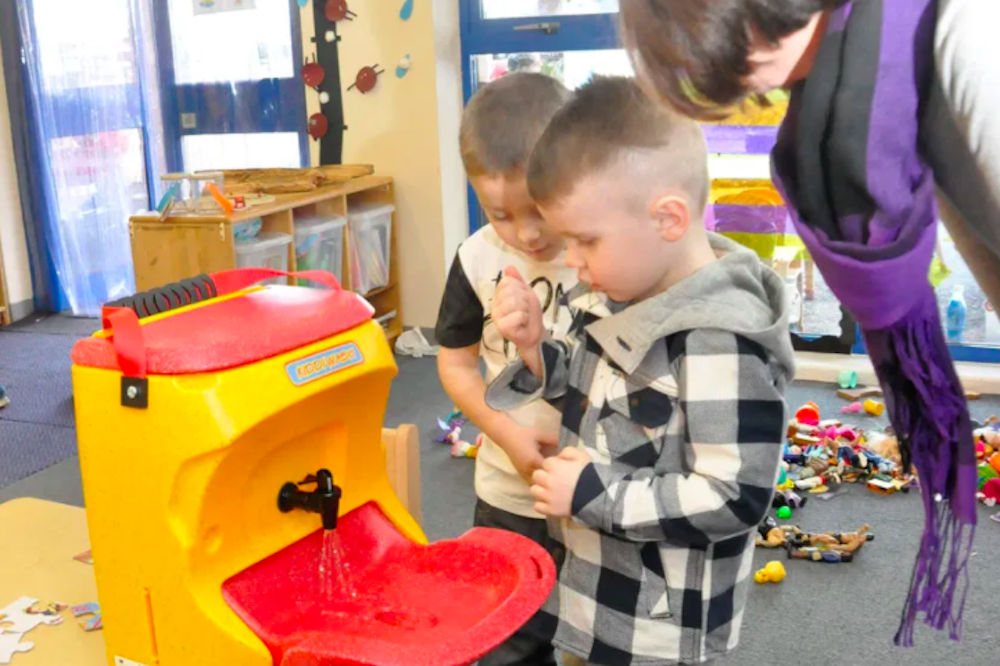Danish children back in class as countries plan to reopen schools

Strict rules on social distancing were in place as younger students became the first in Europe to return to the classroom amid the coronavirus crisis.
Danish children became the first in Europe to return to school this week after a global shutdown that has disrupted education for 1.5 billion young people.
Children went back to preschools and primaries after Denmark’s government relaxed restrictions which had closed all schools since March 12. There are still strict rules on social distancing – with students kept six feet apart in classrooms and some schools teaching outdoors.
Older children at middle and high schools will continue to have online lessons at home until May 10.
“We have a lot of washing hands during the day. We don’t have masks and we have to keep a good distance from each other so that’s a very difficult task,” said Elisa Rimpler of BUPL, the Danish Union of Early Childhood and Youth Educators.
At the reopening of a school in Copenhagen, Danish prime minister Mette Frederiksen said she understood if some parents decided not to send their children.
The picture below shows school children during their lunch break at the Korshoejskolen Public school in Randers this week.
The health crisis has closed schools and universities in more than 190 countries, disrupting education for 91% of all the world’s enrolled students. Theirworld is among leading organisations that have joined UNESCO’s Global Education Coalition, which aims to support countries in scaling up their best distance learning practices and reaching those children and youth most at risk.
As countries grapple with the challenges of the pandemic, here’s a quick look at how some are planning to reopen classes:
Norway. Nurseries will reopen on April 20 and primary schools from first to fourth grades from April 27.
China. In Beijing, senior high school students are set to return on April 27, with seniors at middle schools going back on May 11.
Singapore. Aiming to restart classes on May 4.
Germany. Schools will reopen on May 4, with priority given to final-year students. But North Rhine-Westphalia, the most populous state, is planning to reopen primary schools from the start of next week.
France. President Emmanuel Macron said schools will reopen in stages from May 11.
Switzerland. Primary schools will reopen from May 11, followed by secondaries and universities from June 8.
Mexico. Looking to return to normal from June 1, including schools reopening.
United States. The governors of New York, New Jersey, Connecticut, Pennsylvania, Rhode Island and Delaware said they plan to coordinate on a plan to reopen schools. But no timings were given. President Donald Trump yesterday announced a three-phase plan to reopen the economy, with schools potentially restarting in phase two.
Australia. The government has urged state premiers to reopen schools. It had wanted classes to continue through the health crisis but some states ordered them to be shut. In Victoria, just 3% of children returned to classes after the Easter break this week. In New South Wales, Premier Gladys Berejiklian said: “”We are considering our options around a rostering system which will have some students go back on a particular day. The alternative is that unfortunately students could face up to a year or longer at home and we don’t think that’s appropriate.”
Spain. The government is considering an optional summer education programme to allow children to catch up on lost school time. Education Minister Isabel Celaa said that would be “a plan of school support so that children can be outdoors, exercising and learning”.
Meanwhile, the United Kingdom has announced a $6.2 million contribution to Education Cannot Wait (ECW), the global fund for education in emergencies. It will support ECW’s rapid deployment of education services for children and youth caught in emergencies, including the pandemic.